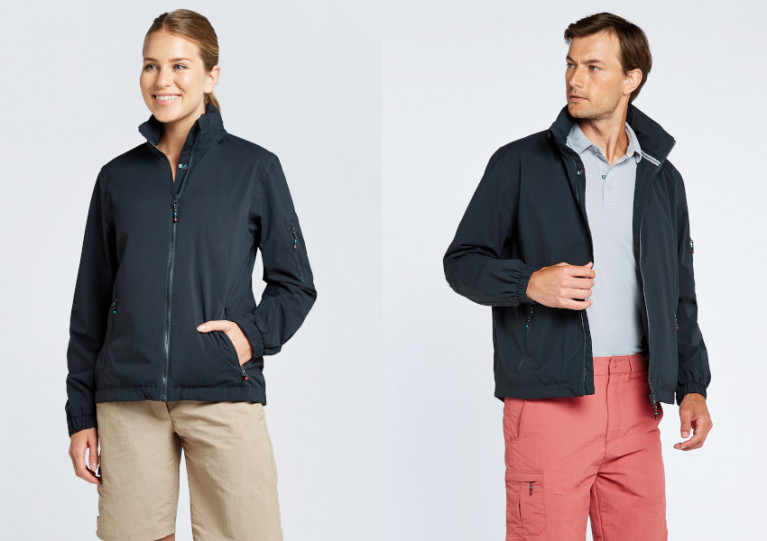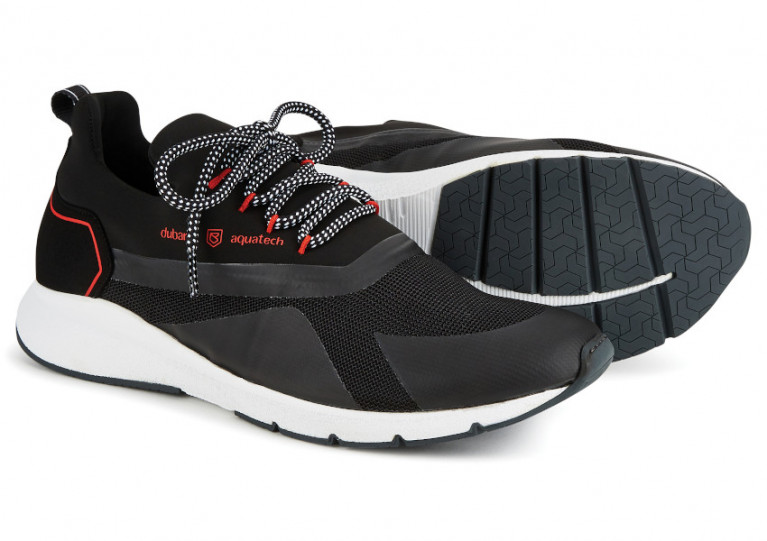Displaying items by tag: Aquatech
Aquatech businesses are urged to apply for a new mentoring programme which Bord Iascaigh Mhara (BIM) describes as “groundbreaking”.
The sector has just attracted a €15 million investment from the Ireland Strategic Investment Fund (ISIF), according to BIM.
Minister for Marine, Charlie McConalogue says that BIM is partnering again this year with aquaculture accelerator, Hatch Blue, for its popular “innovation studio”.
This is a free, intensive two-week programme aimed at supporting young aquatech companies in all aspects of development, including technology and investment.
BIM’s Aquatech Development Programme is supported by the European Maritime, Fisheries and Aquaculture Fund (2021 – 2027) with an investment of €380,000 in 2024.
Now in its seventh year, some 50 projects and companies have completed the “innovation studio”, and have attracted a total investment of around €15 million, creating more than 200 hi-tech jobs.
“Ireland is leading the way in the development of the aquatech sector with some 60 Irish aquatech companies turning over €200 million in 2022 with the potential for significant growth and job creation,” McConalogue said.
He welcomed the €15 million investment by ISIF in the “Blue Revolution Fund” which invests in early stage aquatech companies.
“This is a huge vote of confidence in the sector, which has enormous potential. Aquatech companies can advance the health of the oceans while providing sustainable seafood regenerative ecosystem services and community benefits,” he said.
Aquatech is described as any technology or innovation driving sustainable seafood farming, and it can be applied progressively to the breeding, raising, and harvesting of fish, shellfish, and aquatic plants.
The BIM “innovation studio” offers opportunities for companies in areas such as pharmaceuticals, marine engineering, genetics, feed additives and artificial intelligence.
Applications are open until July 19th, 2024, and the BIM “innovation studio” takes place from October 1st to 10th at the Lee Hotel, Cork City.
Several companies will then be selected to pitch at the BIM Aquatech Conference on October 11th, where the winner of the BIM Aquatech Business of the Year 2024 will also be announced.
Eight to ten successful applicants will be matched with experienced mentors to further develop their business strategy, product or service. They will also have access to a global network of aquaculture technical experts, BIM says.
For further information and to apply click here
Aquamonitrix is BIM Aquatech Business of the Year
An Irish aquatech company which has developed cutting-edge technology to provide a groundbreaking solution to measuring nitrate in water has been announced as the winner of the inaugural BIM Aquatech Business of the Year.
Aquamonitrix, based in Carlow, delivers a dataset to the water industry on nitrates and nitrites that are toxic to fish, but which were previously impossible to measure in real time.
The company was announced as the BIM Aquatech Business of the Year at a conference in Killarney titled “Aquatech – Ireland’s Global Opportunity”. The conference followed a two-week BIM Innovation Studio delivered by aquaculture accelerator Hatch Blue and supported by the European Maritime Fisheries and Aquaculture Fund.
Eight aquatech companies took part.
 Mark Bowkett, Director of Aquamonitrix which has been named BIM Aquatech Business of the Year
Mark Bowkett, Director of Aquamonitrix which has been named BIM Aquatech Business of the Year
Aquamonitrix is an aquatech spin-out from the oil and environmental analysis company TE Laboratories, which started in 1991 carrying out fuel analysis. The company moved into environmental analysis and then developed a solution to monitoring water quality two years ago. Since then, the Aquamonitrix analyser has been bought by fish farms around the world.
Aquamonitrix Director, Mark Bowkett, said the company is delighted to be named the first BIM Aquatech Business of the Year. “This means a lot of us, especially as we are new to the aquaculture sector. Our participation in the BIM Innovation Studio Programme was a gamechanger, and helped us to develop this opportunity. It has been a steep learning curve. But the Innovation Studio helped us to determine that we had a value proposition for the aquaculture industry.”
Today the company employs more than 50 people and has customers from as far afield as Norway, the Netherlands and Canada.
Meanwhile, the conference heard that Ireland’s growing expertise in the developing aquatech sector means it has the potential to become a global leader in the field, with Irish aquatech companies turning over €200m last year.
BIM CEO Caroline Bocquel said over €15m has been invested in aquatech businesses and more than 200 high-tech jobs created in the sector over the last six years.
"Ireland has the potential to be the “Silicon Valley” of the aquatech world"
“Ireland is at a very exciting stage when it comes to aquatech. There are currently 62 aquatech companies operating here, all using technology to enable sustainable seafood farming at a time when the sector is facing many challenges.”
She added: “Ireland has the potential to be a world leader in aquatech and BIM is driving the sector’s development. The Department of Agriculture, Food and the Marine’s Food Vision 2030 strategy is to “promote Ireland as a knowledge base for aquaculture technology and research and attract external investment into the sector.”
Congratulating Aquamonitrix on the award, she said the company is an example of the energy, innovation and talent that exists in the aquatech sector today.
BIM’s Development and Innovation Director Richard Donnelly said: “The scale of the opportunity is enormous. We believe that with proper supports Ireland has the potential to be the “Silicon Valley” of the aquatech world."
"We are starting to see some very significant investments and some brilliant ideas. For example, the use of AI to monitor and provide early warnings on the health of aquaculture fish stocks. The BIM Innovation Studio, now in its 6th year, has played a major role in supporting companies in developing technology and guiding them on attracting investors and commercial scalability.”
The other two Aquatech Business of the Year finalists were Aqualicence, a marine and offshore windfarm consultancy firm supporting on all aspects of licensing applications and Konree Innovation, which uses artificial intelligence and machine learning to outsmart infestation by sea lice, a parasite that affects salmon and other fish.
Ireland’s potential in “aquatech” is the theme of a Bord Iascaigh Mhara (BIM) conference in Kerry today, when one of the keynote speakers will ask why there has been no innovation in this area here in the last two decades.
As The Irish Times reports, Australian marine biologist Neil Sims recalls a conference here on “farming the deep blue” in 2004, where he says that international participants were “blown away” by the enthusiasm and innovative spirit of their Irish counterparts.
A report commissioned by BIM and the Marine Institute for that conference had made an “overwhelming” case for developing and expanding offshore aquaculture.
The UN Food and Agriculture Organisation (FAO) had estimated two decades ago that the demand for fishery products would rise to 180 million tonnes by 2030. One of the report’s key conclusions was that finfish farming must move offshore for environmental reasons, including reduced impact on wild fisheries inshore.
 Richard Donnelly, Development and Innovation Director of BIM
Richard Donnelly, Development and Innovation Director of BIM
“I’d like to know what happened in Ireland since then,”Sims told The Irish Times, before travelling to Ireland, where he is one of several keynote speakers at the BIM conference in Killarney today.
Sims, a specialist in applied marine research, is based in Hawaii. His company, Ocean Era, has developed what is described as the first integrated hatchery and open ocean fish farm in North America.
“In the offshore aqua-technology space, I cannot think of one single innovation that has come out of Ireland in the last 20 years,” he says.
“It strikes me as disappointing, when the world desperately needs sustainable aquaculture, and when a number of leading environmental groups which had been having pitched battles over fish farming 20 years ago in the US now recognise that blue food is required and that a global climate crisis requires a softer planetary footprint,”Sims told the newspaper.
Ireland’s growing expertise in the developing aquatech sector means it has the potential to become a global leader in the field, with Irish aquatech companies turning over €200m last year, BIM has said..
Over €15m has been invested in aquatech businesses in the last six years, and more than 200 hi-tech jobs created in the sector, it says.
Aquatech is described as any technology or innovation driving sustainable seafood farming, and it can be applied progressively to the breeding, raising, and harvesting of fish, shellfish, and aquatic plants.
Participants at “Aquatech – Ireland’s Global Opportunity” in the Brehon Hotel, Killarney, Co Kerry include the Senior Vice President of the world’s first aquatech unicorn company, E-fishery; a US sustainable seafood expert; a global off-shore aquaculture pioneer, along with a host of Irish aquatech entrepreneurs, and representatives from the Irish Strategic Investment Fund (ISIF).
BIM chief executive Caroline Bocquel said: “We have over 60 companies working in aquatech here, and the sector is worth about €200m. Hatch Blue, who we work closely with, is a major aquatech-focused venture capital firm based in Cork, which has already made Irish-based aquaculture investments."
"We’re starting to see some very significant investments and some brilliant ideas – for example, the use of AI to monitor and provide early warnings on the health of aquaculture fish stocks,” Bocquel said.
The conference is linked to the BIM Innovation Studio, an intensive two week no-fee programme that aims to develop the technological readiness, industry fitness and commercial scalability of emerging aquatech startups.
Funded by the European Maritime and Fisheries Aquaculture Fund (EMFAF) and now in its sixth year, the initiative seeks out projects in Ireland and other European countries that aim to upscale the region’s aquaculture or alt-seafood industries.
To date, the total investment attracted is close to 50 projects and companies that have completed the Innovation Studio over the past six years – including 2023 - is €15.1M, with over 200 hi-tech jobs created, BIM says.
Several companies involved in this year’s Innovation Studio attended a delegation to Southeast Asia earlier this year with Hatch to grow their network and learn more about their potential market. The delegation has secured potential business opportunities on foot of this, BIM says.
The Innovation Studio supports the ambitious goals set out in the Department of Agriculture, Food and the Marine’s Food Vision 2030 Strategy, namely to ‘promote Ireland as a knowledge base for aquaculture technology and research and attract external investment into the sector’, BIM says.
Read The Irish Times report here
Along with its new performance trainers, Dubarry’s Aquatech collection also includes marine clothing for all conditions you’ll experience on the water.
The clothing collection contains many protective features ranging from UPF sun protection, wind and water resistance to highly breathable performance.
There are many practical attributes such as anti-odour, moisture wicking, quick dry and even a hidden removable eyewear cleaning cloth on most styles.
And selected styles are designed to allow for personalisation, with space for embroidery or printing of boat, team or crew names.
Levanto and Corfu are the new lightweight crew jacket designs in the Aquatech range.
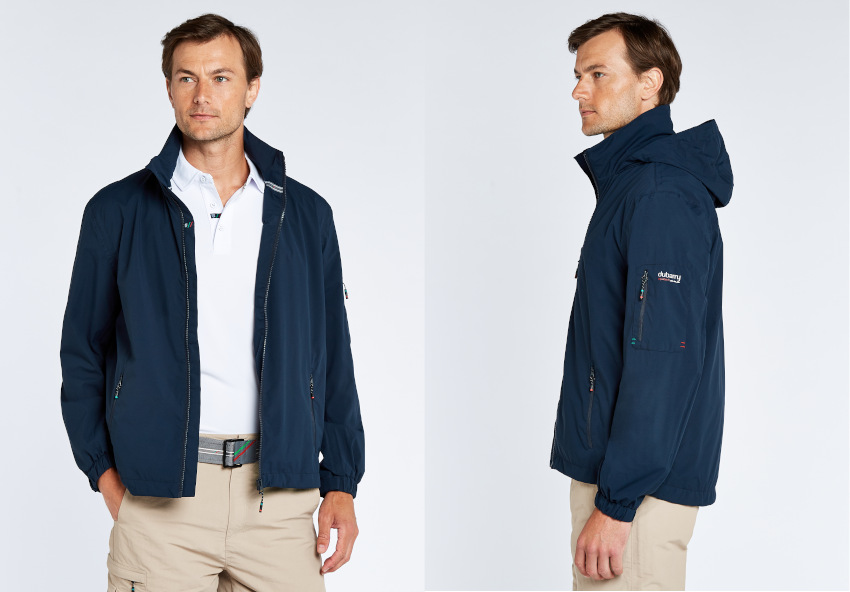
The Levanto men’s crew jacket is a stylish and versatile, durable and practical, and offers exceptional levels of waterproofing and breathability for this style of jacket while preserving your freedom of movement and keeping you snug inside.
Key features include taped seams and adjustable cuffs to keep water out and warmth in while allowing an adjustable fit. The lightweight polyester mesh lining adds extra insulation and super-soft nylon inner sleeves make it effortless to slip on and off.
The zipped, stand-up collar is equipped with a chin guard and a cleverly concealed, rollaway hood keeps the worst of the weather at bay. There’s also a built-in cleaning cloth on a bungee cord to keep your eyewear crystal clear.
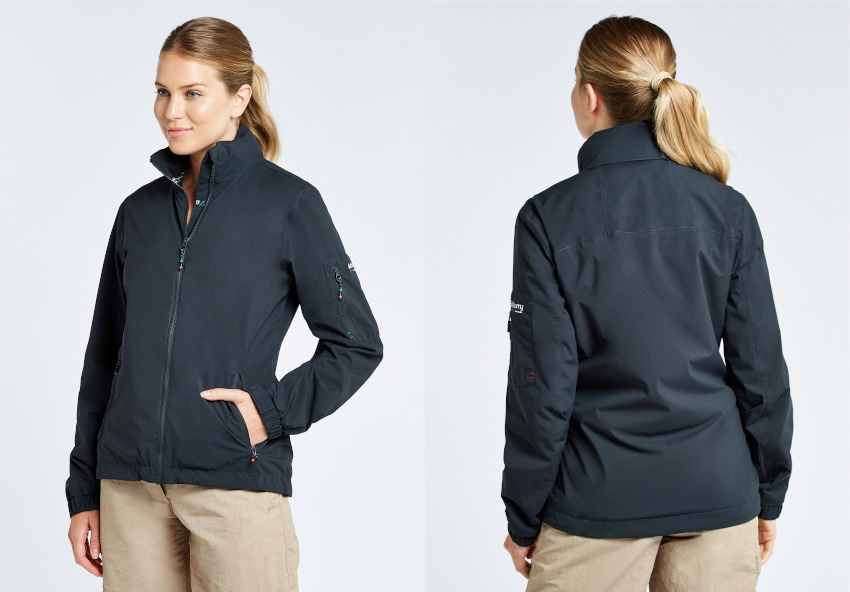
The Corfu women’s crew jacket is a reliably waterproof and impressively breathable. This snug new style of lightweight jacket is designed and built to provide excellent insulation from chilly headwinds without being heavy or bulky.
It’s loaded with technical features like fully taped seams, padded chin guard and adjustable cuffs, impermeable outer shell and super-soft inner lining. The zipped, stand-up collar keeps the wind chill off your neck and incorporates a neatly concealed, rollaway hood that deploys in an instant when the weather turns foul.
It’s stylish and comfortable, cosy and practical. Details include top-quality YKK zips and an optical-grade cloth on a stretchy cord in one of the pockets to wipe the salt spray off your sunglasses.
Both the Levanto and Corfu are available in two colours and various sizes (Levanto S–3XL; Corfu 32–44), priced at €169 RRP.
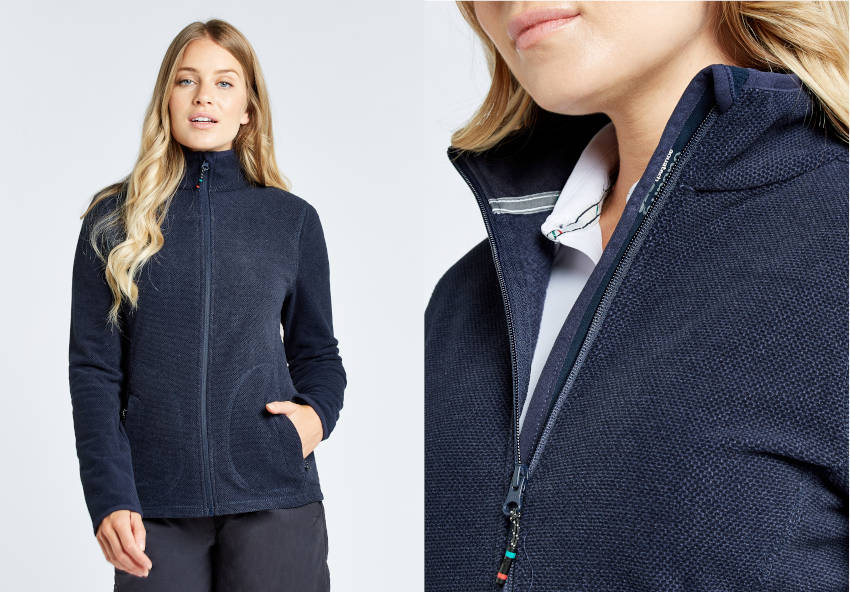
Keep out the chill on deck is easy with the Mustique and Sicily full-zip fleece jackets.
The Sicily fleece (above) is medium-weight, soft-textured and ideal for any sort of boating in a temperate climate. Not just warm and quick-drying but also wind resistant and fully breathable.
And with a full-length zip so you can slip it on easily and shrug it off in an instant — ideal for days of patchy sunshine and gusty winds, and when the breeze builds up or the temperature drops, the well-engineered zips won’t leave you fumbling with cold fingers.
In chillier weather, it’s the perfect mid-layer to wear under your all-weather foulies, providing excellent insulation without being too bulky.
Technical features include a stretchy hem and cuffs for a flexible fit, zipped hand-warmer pockets with a warm, brushed lining, a draught-excluding chin guard, and flat locked seams for comfort.
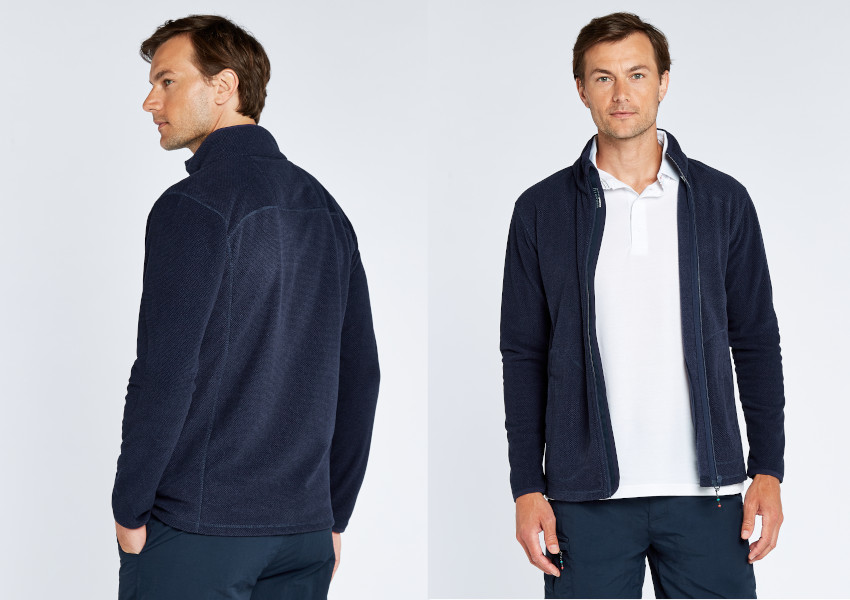
The Mustique fleece is for any sort of boating in a temperate climate and when you’ll need a warm, quick-drying fleece, ideally one with a full-length zip so you can slip it on in an instant when the sun disappears behind the clouds.
The mid-weight fleece retains heat effectively while remaining breathable, with a texture that feels cosy against the skin — ideal as a mid-layer garment providing excellent insulation beneath your all-weather foulies, or worn as an outer layer in more clement weather. It also comes with technical features comparable as the Sicily.
Like the crew jackets, the Mustique and Sicily are available in two colours and various sizes (Mustique S–3XL; Sicily 32–44). The Mustique is priced at €99 RRP, with the Sicily at €89 RRP.
Complete the look and browse footwear, polos, shorts and accessories from Dubarry’s new Aquatech collection in the virtual catalogue HERE.
Dubarry Introduces New Aquatech Footwear Collection
Dubarry’s new Aquatech Collection has been specifically designed for use across a wide variety of nautical environments.
Joining the existing Easkey and Skerries trainers for men and for women are the Antibes and Palma. Both are available in multiple colours and retail at €129 RRP.
They come with all the key performance features you would expect from Dubarry’s heritage dating back to 1937.
The trademark NonSlip-NonMarking rubber outsole delivers sure-footedness on all deck surfaces, thanks to a unique system of water dispersion channels that prevent aquaplaning.
And coupled with the lightweight EVA midsole, both shoes offer exceptional underfoot comfort.
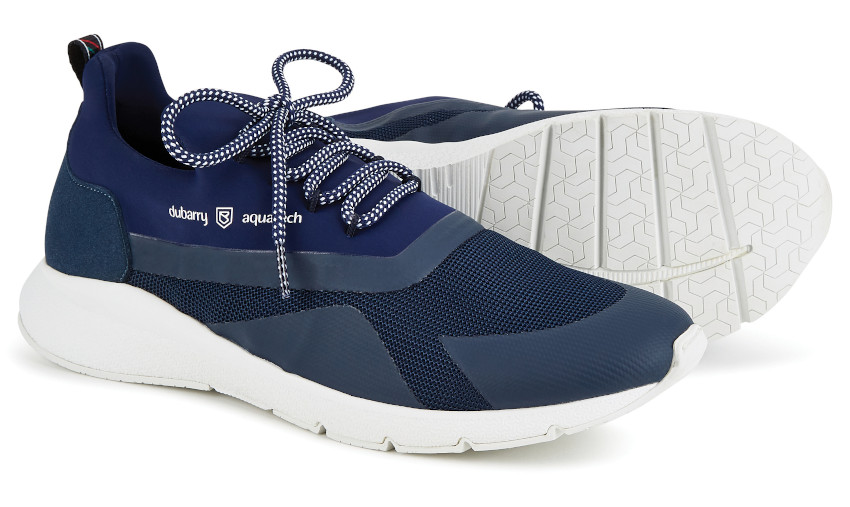
Antibes is an ultra-light, high-performance sneaker that’s engineered to boost your natural agility and is loaded with numerous technical features.
The hardwearing sole has excellent shock-absorbing performance and the removable footbed moulds to the contours of your instep, delivering the ultimate comfort.
The super-soft upper is made from quick-drying technical fabric with antimicrobial and anti-odour properties built in. And the partly concealed lacing is precisely adjustable to ensure a perfect fit.
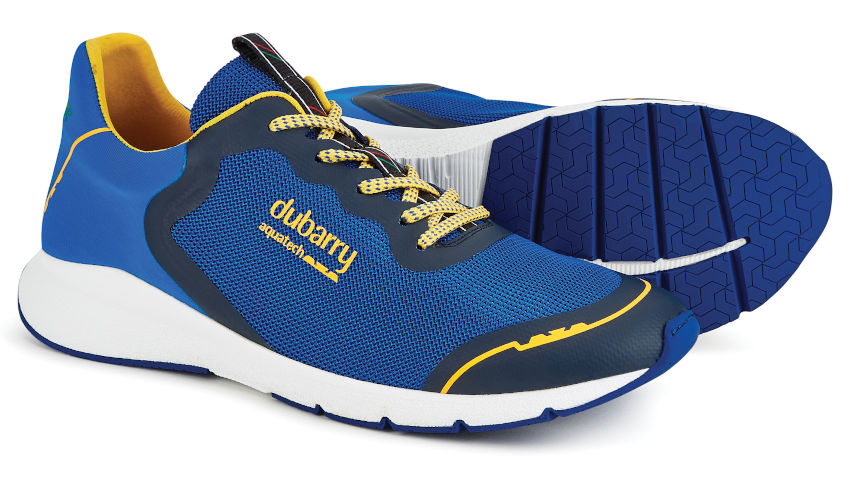
Palma is Dubarry’s our super-light, sure-footed and sporty sneaker offering the ultimate comfort.
Extra-soft uppers and full lacing for a precise fit are combined with a uniquely designed footbed that moulds to match the shape of your foot, plus a high-performance shock absorbing EVA midsole.
Remarkable agility is assured on deck — or anywhere else — with signature NonSlip-NonMarking outsoles. The footbed is removable for easy washing and the uppers are made from quick-drying, breathable and anti-microbial technical fabrics.
Complementing these are the lightweight Fastnet boots (RRP €229) which have an athletic design with outstanding technical performance.
They are not just waterproof, with a breathable membrane; they're impressively shock-absorbent, too. The removable footbed provides extra cushioning and the D-Chassis system delivers additional support, protection and control for heels and toes while preserving your agility.
And the award-winning NonSlip-NonMarking rubber outsole has a unique water dispersion channel system to eliminate the risk of aquaplaning on wet decks.
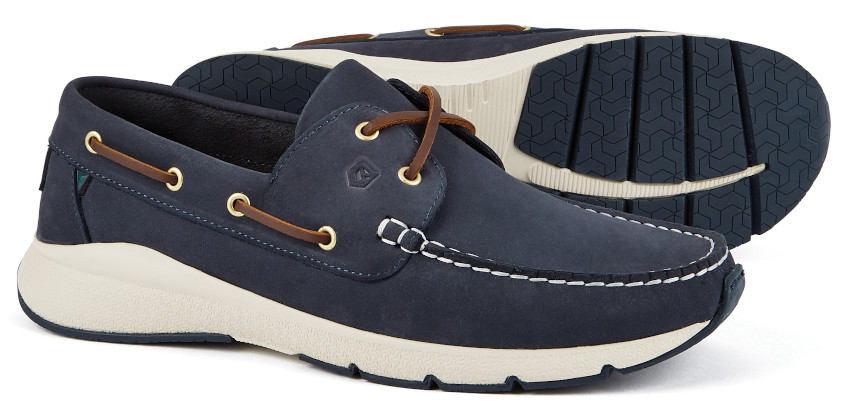
Meanwhile, the Dungarvan deck shoe (RRP €169) combines the classic good looks of authentic, traditionally handmade leather deck shoes with the shock absorption, support and comfort of lightweight technical trainers, plus the excellent grip of Dubarry’s award-winning NonSlip-NonMarking outsoles.
The uppers are crafted from high-quality nubuck and our unique DryFast-DrySoft leathers with a water-resistant finish and a hand sewn, waterproof chain butt seam on the toecap.
Explore the full Aquatech collection — including the Crosshaven, Ultima and Shamrock boots built for the ocean — in the virtual catalogue HERE.



























